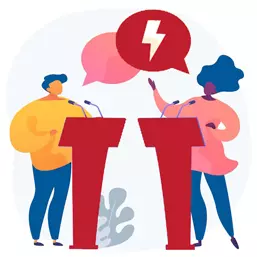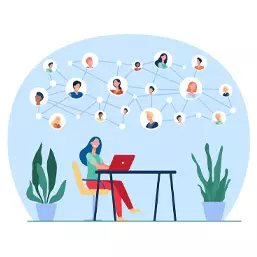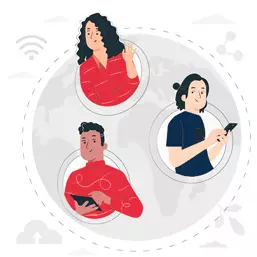
Developing Verbal Communication Skills
The problem with communication is the illusion that it has been accomplished.
– George Bernard Shaw
Introduction
Interpersonal skills are the abilities that we utilize on a daily basis when we speak and engage with other people, both one-on-one and in groups, whether it be in a professional or personal capacity. They include a broad variety of abilities, the most important of which are those pertaining to verbal communication. The majority of us participate in at least one kind of interpersonal communication on a daily basis, sometimes several times per day. The degree to which we are able to communicate effectively with other people is a measure of our level of proficiency in our interpersonal relationships. One of the most important skills one may have in life is interpersonal communication, which can be used to:
- Both give out and take in information.
- Have an effect on the mentalities and actions of other people.
- Establish connections, and prioritize keeping relationships active.
- Find meaning in the world and the experiences we have had in it.
- Communicate one’s own requirements and attempt to comprehend those of others.
- Both giving and receiving emotional support is important.
- Create choices and find solutions to issues.
- Behaviour should both be anticipated and predicted.
- Regulate power.
Words are one of the most effective instruments for communication. Indeed, the choice of words that we use may very quickly affect the ideas, attitudes, and actions of the people who are listening to us. In a similar way, paying careful attention to the language used by other people may provide us with an understanding of what it is that they are really trying to convey, which in turn enables us to reply in an appropriate and efficient manner. Important verbal communication skills, such as the art of listening, asking questions, and talking with strength will be covered in this lesson.
Warm up Exercise
The purpose of this exercise to get you thinking about the Interpersonal Skills you are already practicing and where you can improve.
Think of a social situation that you consider most stressful. This situation can be within an employment, community, family, or recreational setting. Example: introducing one’s self to strangers.

After coming up with the social situation you find most stressful, answer the following questions:
- What aspect of this situation do you find most stressful? Why?
- What do you think are the interpersonal skills needed in order to successfully navigate this situation? List down at least three.
- On a scale of 1 to 5, with 1 being the least effective and 5 being the most, rate your effectiveness in practicing the skills you listed.
- Looking at your responses, which skills do you practice most effectively? What helps you in practicing these skills well?
- Which skills do you practice least effectively? What keeps you from practicing these skills well?
Brief check
Communication is a two-way process. It is about passing information from one person to another. This means that both the sending and the receiving of the message are equally important. Verbal communication therefore requires both a speaker to transmit the message, and a listener to make sense of the message.
What is verbal communication?
Any sort of communication that exchanges information with other people via the use of words is referred to as verbal communication. These are words that can be written as well as spoken.
There is a wide variety of expertise to be found in the realm of verbal communication. They vary from the blatantly evident, such as being able to talk articulately or listen attentively, to the more covertly apparent (such as reflecting and clarifying). The process of verbal communication may be made easier by speaking clearly, keeping one’s cool and staying focused, being courteous, and adhering to a handful of fundamental norms of etiquette.
Establishing Initial Contact
The first few minutes of any kind of meeting with other people are of the utmost significance. First impressions are very important and have a substantial bearing on the success of subsequent and future interactions.
When you first meet someone, you generate an initial image of them based on how they seem, how they sound, and how they act, in addition to whatever you may have heard
about them from other people. This impression may be positive or negative, depending on how you perceive them.
At least to some degree, all of your subsequent conversations will be influenced by this first impression. For instance, when you first meet someone and listen to them talk, you immediately create an opinion on their history as well as the probable amount of aptitude and knowledge they possess. It’s possible that this will influence what you say. For instance, if you are exposed to a foreign accent, you could conclude that your language has to be simplified in order to communicate effectively. It’s possible that you’ll also come to the conclusion that you’ll have to pay closer attention to what other people are saying to you in order to make sure that you comprehend what they’re saying.
There’s always a chance that you’ll change your mind about what you thought at first. When you learn new information about your contact or as you grow to know them better, you need to make sure that you intentionally “update” your thinking about what you know about them.
Skills Necessary for Effective Verbal Communication, Including Speaking and Listening
The words you select to say, how you say them, and how you reinforce what you say with other forms of non-verbal communication are the three primary components of effective public speaking.
The conveyance of your message, as well as how it is received and comprehended by your audience, is impacted by all of these factors.
It is important to give serious thought to the words you choose to use. Even when you are talking about the same topic, you will usually need to switch up the phrases that you use in various scenarios. For instance, the way in which you discuss a topic with a close colleague will vary significantly from the way in which you present it at a large conference.
Your tempo and tone of voice are also components of how you communicate. As is the case with non-verbal communication in a broader sense, they convey essential information to your audience, such as the extent of your interest and dedication in the topic at hand or whether or not you are anxious about how they will respond.
One of the most crucial skills is active listening. Nevertheless, when we speak with one another, we have a propensity to invest a great deal more mental effort pondering what it is that we are going to say than we do really listening to the other person.
A fundamental component of successful verbal communication is attentive listening. You may improve the quality of your listening in a number of different ways. Here are some of the following approaches:
– Be ready to pay attention and listen. Focus your attention on the person who is speaking rather than thinking about how you will respond.
– Maintain an open mind and refrain from passing judgment on the person who is speaking.
– Pay attention to the most important point that the speaker is trying to make. Make an effort to comprehend not just the big picture of what they are attempting to convey but also the specifics of the language that they are using.
– Avoid distractions if at all feasible. For instance, if there is a lot of noise in the background, you can recommend that you travel to another location so that you can have your conversation.
– Be objective. While the other person is providing information, you should refrain from trying to think of the next question you want to ask.
– Do not focus excessively on one or two aspects to the exclusion of the others. Make an effort to make use of the big picture as well as all of the facts that you have.
– Avoid placing the speaker in a preconceived category. Make every effort not to allow biases, such as those related with gender, race, accent, social status, appearance, or attire, prevent you from understanding what is being said.

Advanced Techniques to Improve Verbal Communication
You may make your verbal communication more successful by making use of a variety of tools and strategies, all of which are at your disposal. Included in this category are activities such as reinforcing, reflecting, clarifying, and questioning.
The employment of encouraging words in conjunction with non-verbal gestures such as head nods, a kind facial expression, and keeping eye contact is an example of reinforcement.
All of these things contribute to the development of rapport and are more likely to encourage openness in other people. The use of encouragement and positive reinforcement has the potential to do the following: Motivate others to take part in the conversation (especially when working in a group); Demonstrate an interest in hearing what other people have to say; Prepare the groundwork for the formation and/or continuation of a relationship; Put an end to people’s worries and reassure them; Exhibit friendliness and openness; and Eliminate timidity or uneasiness in both ourselves and others around us.
In a general sense, we get knowledge from other people on certain subjects by questioning them. It is important to ask questions since they allow you to evaluate your comprehension and clarify any areas that are unclear. You may also find that it enables you to more openly seek help from other people.
On a more social level, asking questions is a valuable tactic that may be used to initiate dialogues, bring someone into a topic, or just demonstrate interest in something. Therefore, the ability to ask pertinent questions is necessary for the process of verbal communication. There are primarily two kinds of questions that we ask:
Closed Questions (Questions With No Answers)
Closed questions often only need a one- or two-word response (most commonly, “yes” or “no”) from the respondent. Because of this, they restrict the range of the reaction. Two examples of closed questions are “Did you go by groceries today?” and “What time did you arrive at your office today?” The person asking the question is able to maintain control of the conversation while using questions of this sort. When aiming to increase verbal communication, you should avoid asking closed questions because you do not want monosyllable answers. On the contrary you should ask open-ended questions more frequently.
In spite of this, closed questions may be helpful for concentrating a debate and receiving responses that are clear and to the point when they are required.
Open Questions
Questions that are left open need more debate and explanation. As a result, they extend the field of possible responses. For instance, “How bad was the traffic when you got to work this morning?” is one of them. “What do you believe it is that you stand to gain by participating in this conversation?” It will take more time to respond to open-ended inquiries, but doing so will provide the other person far more room for self-expression and will promote participation in the dialogue.
The act of conveying to another individual your comprehension of what has been communicated to you is referred to as reflecting.
Reflection is a specialized talent that is often used in the field of counseling; nevertheless, it is also applicable to a broad variety of communication situations and is thus an important skill to have.
When you reflect, you should often rephrase in your own words the information that was conveyed to you by the person who was speaking. You need to make an effort to distill the facts and sentiments that were conveyed into their essential components and then transmit your comprehension of what was said to the original speaker. This is a valuable ability since it allows you to verify that you have received and comprehended the information in its entirety.
The message’s delivery is evaluated, and the speaker is given the opportunity to make any necessary corrections or additions before moving on. It shows curiosity in the other person’s opinion as well as respect for what they have to offer. You are giving the impression that you are taking into account the perspective of the other person.
Clarification is an important part of effective communication because it includes conveying to the person who has just spoken the core of what was conveyed by the listener in their understanding of what was said. Consequently, this allows for the validation of the listener’s comprehension as well as the elimination of any potential areas of difficulty or misunderstanding.
Clarification is essential in a wide variety of scenarios, particularly in those in which the content that is being conveyed is challenging in some manner. Communication may be “difficult” for a variety of reasons, including but not limited to the following: sensitive emotions are being discussed; you are listening to some sophisticated information or following directions; or you are following someone else’s instructions.
In order to clarify anything, you could ask follow-up questions or even periodically summarize what the speaker has just stated. When a listener is unable to comprehend the speaker’s remarks, they have the option to inquire further for clarification. There are instances when the messages that a speaker is trying to convey might be quite complicated, including a wide variety of individuals, topics, locations, and/or periods of time. Clarification enables you to organize all of these things and assess the speaker’s priorities at the same time.
Both the speaker and the listener have a better chance of understanding and making sense of these difficult and often confusing topics if they are clarified. Clarification requires sincerity on the side of the listener, and it demonstrates to the speaker that the listener is interested in them as well as in what they have to say.
Queries like “I’m not quite sure I understand what you are saying” are instances of non-directive questions that request explanation but don’t directly address the issue.
“I don’t think I really understand the primary concern at hand.”
“When you said ……..what did you mean?”
“Are you able to state that again…?”
The process of clarifying entails asking questions without passing judgment.
I will summarize, and I would appreciate any criticism you have on its veracity.
Summarising and Ending Communication
A synopsis is an outline of the most important ideas or topics that were brought up.
The act of ‘reflecting’ may likewise serve the same goal as summarizing does. However, by providing both parties with a chance to examine and agree upon the message, summarizing makes it possible to check if communication has been successful. Summaries, when used correctly, may also act as a roadmap for the subsequent tasks that need to be taken.

One’s recollection of a discussion will be shaped, at least in part, by the manner in which a communication is concluded or brought to a conclusion.
When people want to stop a discussion, they will utilize both verbal and non-verbal cues.
Phrases such as “Well, I must be gone” and “Thank you very much, that is really helpful” are examples of verbal signals that might be used.
A person may come to a non-verbal conclusion by beginning to avoid eye contact, rising up, turning their back, or engaging in behaviors such as gazing at a watch or shutting notepads or books. These behaviors, which are not verbal, convey to the recipient of the message that the initiator desires to terminate the interaction.
People often employ a combination of these, but they typically begin with the non-verbal cues, particularly when communicating face-to-face. Verbal signals are very necessary when communicating by telephone.
If you end a conversation or exchange too abruptly, the other person may not have the opportunity to ’round off’ what they were saying; thus, you should make sure there is time for winding-up. When an encounter comes to a close, it is an ideal moment to make any preparations for the future. Last but not least, it is almost certain that this period will be accompanied by a variety of gestures that are considered socially appropriate for a parting.
Brief check
People with strong interpersonal skills tend to be able to work well with other people, including in teams or groups, formally and informally. They communicate effectively with others, whether family, friends, colleagues, customers or clients. They also have better relationships at home and at work. You can improve your interpersonal skills by developing your awareness of how you interact with others and practicing your skills.
Listening and hearing aren’t the same
Although most individuals can hear, only a few can really listen.
The act of recognizing sounds that are present in our surroundings is what we refer to as hearing. The biological processes that are a part of sensory perception are the greatest approach to demonstrate hearing since they are so complex. To be more specific, our ears are responsible for picking up sound waves that are present in our environment, sending signals to our brain, which in turn informs us about the nature of the sound and the location from which it is emanating.
On the other hand, listening involves more than just picking up on the many stimuli that are going on around us and determining what these stimuli are. When we listen, we must take the further steps of actually comprehending what we have heard, as well as giving what we have heard our undivided attention and careful thinking. It is possible to argue that listening requires a more active engagement on the part of an individual than just hearing does.
Consider the following scenario to better understand the distinction between hearing and listening:
A secretary went into the office of her employer and gave her boss a copy of the agenda for the next day as she entered the office. The secretary reported to the manager that she would have a very busy day the next day, and that she will only have one hour of break time throughout the whole afternoon.
The boss was focused on reading a report at the time, so all he did was give a quick nod to the secretary and signal for her to set the agenda on her workstation. The manager carried on as if there had been no interruption and proceeded to read the report. In this instance, the boss did nothing more than hear what the secretary had to say; the boss paid just the right amount of attention to be able to respond in a manner that was suitable but did not commit to anything.
It is possible that the boss’s response might have been different if she had been listening.
She would have stopped what she was doing and given undivided attention to the secretary while she was speaking. She was reading a report at the time. It’s possible that she considered what the message was trying to say to her as well. When she found out that she had a busy day ahead of her, she might have, for example, planned to have her lunch delivered, or she could have reminded herself that she needed to get a good night’s sleep.
It is possible for a person’s interpersonal interactions to improve in a variety of ways if they make the additional effort to transition from hearing to listening. Listening enables a person to have a more precise and in-depth comprehension of another person’s speech, which in turn assists them in providing the most pertinent answer possible. However, the most important thing that you convey to another person when you listen to them is that you appreciate not just what it is that they are saying but also the fact that they are there.
Brief check
If the purpose of communication is the sharing of information between two or more individuals, then the use of questions is an effective method for eliciting the particular information that one is seeking. However, well-prepared questions are what really make a discussion interesting to listen to. It may break new ground, develop rapport, pique interest and curiosity in others, express your own earnestness in learning what others around you have to say, and ignite interest in others in what you have to say.
Listed below are some pointers that can help you formulate queries more effectively:
Ask! In the first place, don’t be hesitant to talk to people and ask questions! It’s possible that we don’t ask inquiries because we’re too timid, worried about committing a social faux pas, or afraid of being labelled as a bothersome busybody. Even while there are some topics that should not be brought up in the beginning stages of a discussion (we will talk more about this later, in the section on Different Levels of Conversation), there is nothing inappropriate about asking questions in and of themselves. Start with your natural inclination to be interested in other people; if you are really curious in another person, you will never run out of questions to ask them.
Ask open inquiries. As was said before, there are two distinct types of questions that may be classified according to the breadth of the responses they elicit: open questions and closed questions. o Questions that can only be answered with a yes or a no are called closed questions. For Example: “Are you pleased with the presentation that was given today?” o On the other hand, open inquiries are questions that demand an answer that is qualified in some way. The words who, when, where, what, how, and why are often included in front of open-ended queries. Example: “Which aspect of the presentation that we will be giving today do you believe to be the most interesting to you?” o Open questions are more successful than closed questions because they encourage serious examination of the issue and innovative thinking on the part of the respondent.
Ask intentional questions. There are many various reasons why we ask questions, and it is essential that we be conscious of the reason(s) behind our own question(s) when we submit them. By doing so, we may improve the way we construct our inquiries and ensure that the questions remain relevant.
For instance, we may ask questions with the intention of putting the other person at ease in order to accomplish our aim. Questions such as these need to be formulated in a nice, non-threatening way, and they ought to contain topics that the other person is probably interested in. Take this example: “Wow, that’s a beautiful blouse! Where did you obtain it?”
Some questions are constructed to provide a mental obstacle to the person being questioned and to stimulate an animated discussion or thoughtful consideration. It is important that questions of this kind be posed in a manner that is both process-oriented and targeted. It is also capable of challenging pre-existing preconceptions about the topic at hand. For instance, “In your opinion, what are some ways that a leader might better encourage his team?”
On other occasions, the purpose of questions is to urge a person to participate in a debate that is already in progress. The purpose of these questions is not just to collect information but also to encourage engagement from the audience. Take this example: “I find Matthew’s approach to be incredibly invigorating. What are your thoughts on this, Frank?”
Think about what you and the person you’re talking to need at the stage of your relationship, and then ask the other person questions that may meet that need. This will allow you to be more successful in your communication.
Using one's voice to command respect
The capacity to influence, convince, or create an impression is what we mean when we talk about having power in communication. Self-confidence, credibility, and efficiency are the three components that contribute to a successful communication.
The following are some examples of powerful verbal communication that you may use:
Remember to get to the point. It’s not about being able to cram as much information as you can into a certain amount of time that counts as effective communication. Rather, it is about remaining focused on what is pertinent to the topic at hand and communicating your point in the shortest, but most impactful, manner that is feasible. Remove any unnecessary pauses from your speech, such as “um,” “you know,” or “really,” and steer clear of utterances that are off subject. Just provide the minimal essentials, such as the concepts that your audience would be most interested in learning more about or the ones that best support your goals and objectives.
Don’t act like it’s no big deal. Take into consideration that the language you would use while chatting with friends is not always the language you would use when meeting with business associates. Your reputation may suffer if you communicate in a manner that is characterized by slang, street talk, or bad language, particularly if you are interacting with prospective customers, employees, or business partners. When you are participating in activities that need you to seem impressive, it is possible that you may be required to employ industry-specific vocabulary and to speak in a professional tone.
Place an emphasis on important topics. Place emphasis on the most important aspects of your speech; for instance, those who are presenting a sales presentation have to place an emphasis on the primary attributes of the product or service that they are selling. Those who are expressing their viewpoint on a matter should first clarify the core of their reasoning, and then proceed to expand upon those points. Even if all you’re doing is congratulating someone or showing interest in what they’re doing, you should make sure the person you’re talking to will remember what you have to say. In verbal communication, emphasis may be conveyed by a variety of methods, such as the repeating of crucial points, the provision of specific instances, the accentuation of certain adjectives or nouns, or even the direct stating of the phrase “this is truly a point I want to highlight.”
Tailor-fit your message to your audience. The ability to connect with one’s audience is essential to effective communication. In this scenario, it is extremely vital to keep in mind the preparedness, attention, age, and educational level of your audience in order to avoid either overpowering or under powering them with your presentation. Flexibility is the most important aspect of having good social skills; the more easily you can adapt to changes in the demographics of your audience, the better off you will be.
Connect. The strength of your relationship with other people may sometimes be a determining factor in how much power you wield while communicating. It’s possible that you’ll need to “warm up” your audience, make them feel at ease, and demonstrate that you really want to have a conversation with them. The more that other people see you to be “one of them,” the more receptive they will be to whatever that you have to offer to them. Your ability to connect with other people may be greatly aided by your non-verbal communication.
Communicating with authority
Power in communication refers to the ability to influence, persuade, or make an impact. A powerful communication is associated with self-confidence, credibility, and effectiveness.
The following are some ways you can communicate with power verbally:

Stick to the point. Powerful communication is not about saying as many things as you can in a given period of time. Rather, it is about sticking to what is relevant to the discussion, and getting your message across in the shortest — but most impact-laden — way possible. Get rid of fillers like “uhm…”,“you know”, or “actually” in your delivery, and avoid off-topic statements. Just provide the bare bones — the ideas your audience would be most interested in knowing, or the ones that promote your intentions best.
Don’t be too casual. Note that phrasing appropriate when talking with friends is not necessarily appropriate for business-related meets. The use of slang, street talk, and poor grammar can detract from your credibility, especially if you’re mingling with potential clients, employers, and business partners. Events that require you to come across as impressive may require the use of industry-specific jargon and a formal tone — so adjust accordingly.
Emphasize key ideas. Stress the highlights of your communication. For example, people who are delivering a sales pitch should emphasize the main features of their product or service. Those who are presenting their opinion on an issue should explain the crux of their arguments, and build from there. Even if you’re merely expressing interest or congratulations, make sure the person you’re talking to would remember what you have to say. Emphasis in verbal communication comes in many ways, including repetition of key points, giving specific examples, accenting particular adjectives or nouns, or even directly saying that “this is really a point I want to emphasize.”
Tailor-fit your communication to your audience. A powerful communication is one that connects with one’s audience. In this case, minding the readiness, attention, age, and educational level of your audience is very important, so that you don’t overwhelm or underwhelm them. Social skills are primarily about flexibility; the better you can adjust to changes in your audience profile, the better off you’ll be.
Connect. Power in communication is sometimes determined by the quality of your rapport with others. You may need to “warm up” your audience, make them comfortable, and show them that you sincerely want to talk with them. The more others see you as “one of them”, the better their reception of anything that you have to say will be.
Your non-verbal communication can be a big help in connecting with others.
Practical Application
Leo is a legal intern. He’s employed for a two-month internship that entails assisting attorneys, meeting with clients, and attending court. Leo’s effectiveness declined after a few days, causing inefficiency and client unhappiness. The management realised Leo lacked interpersonal skills after reviewing his work practices. They wrote a written report to Leo’s university supervisor. The main content of the report contained the following points that include his weaknesses and suggestions to improve:
“Leo lacks language skills. He has trouble communicating with his seniors and colleagues. His speech is unprofessional and flat.
He is unprofessional and sometimes ends up being rude to his seniors. This causes misunderstanding and communication problems at work.
Leo’s interpersonal abilities can be improved with a few changes. First improve upon his lacking language skills. He must communicate with his coworkers and clients more often to understand their needs. He should be more professional and use non-aggressive, positive, official tones. His body language must adapt to reassure others. While speaking, he must sit upright, manage his upper body, and make eye contact.
Leo must also concentrate by listening carefully. This will lead to increased understanding and efficiency as well as his case management would improve. Leo’s negotiation skills can be improved with better communication and listening. This helps understand others’ weaknesses and discuss them properly.
Interpersonal abilities at work affect the entire company. Improving communication and breaking down obstacles will boost workplace efficiency. Cooperation and assistance are key. It increases communication and understanding of situations and people’s emotions”.
This report helped Leo immensely. He was very thankful to the management of this legal firm as he had clear goals now to work upon his interpersonal skills.





